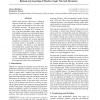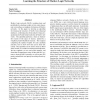1167 search results - page 56 / 234 » Relational Markov Games |
117
click to vote
AAAI
2007
15 years 2 months ago
2007
In timed, zero-sum games, the goal is to maximize the probability of winning, which is not necessarily the same as maximizing our expected reward. We consider cumulative intermedi...
81
Voted
FOCS
2002
IEEE
15 years 4 months ago
2002
IEEE
We consider the problem of sampling almost uniformly from the set of contingency tables with given row and column sums, when the number of rows is a constant. Cryan and Dyer [3] h...
ICML
2007
IEEE
16 years 21 days ago
2007
IEEE
Markov logic networks (MLNs) are a statistical relational model that consists of weighted firstorder clauses and generalizes first-order logic and Markov networks. The current sta...
ICML
2005
IEEE
16 years 21 days ago
2005
IEEE
Markov logic networks (MLNs) combine logic and probability by attaching weights to first-order clauses, and viewing these as templates for features of Markov networks. In this pap...
106
click to vote
DAGSTUHL
2006
15 years 1 months ago
2006
One of the main difficulties faced when analyzing Markov chains modelling evolutionary algorithms is that their cardinality grows quite fast. A reasonable way to deal with this iss...


